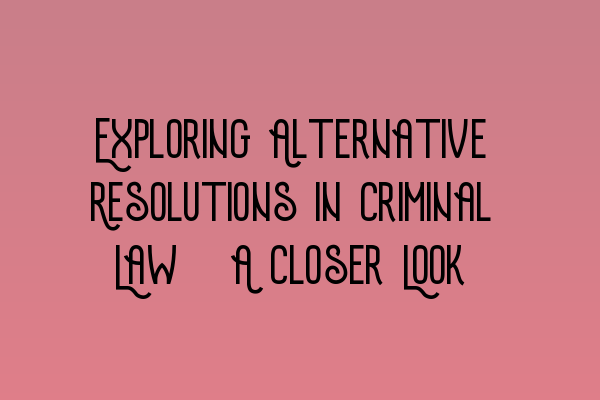Exploring Alternative Resolutions in Criminal Law: A Closer Look
In the field of criminal law, there has been a growing recognition of the importance of exploring alternative resolutions to traditional court proceedings. As solicitors at SQE Criminal Law & Practice Law UK, we understand the need to provide our clients with effective and efficient legal solutions. In this blog post, we delve into the concept of alternative resolutions in criminal law, examining their benefits, challenges, and potential impact on the legal system as a whole.
The Need for Alternative Resolutions
Traditional court proceedings can be lengthy, costly, and emotionally draining for all parties involved. Moreover, the overcrowded court dockets often lead to delays in trials, which can result in an unjustified burden on defendants awaiting their day in court. Alternative resolutions, such as diversion programs, mediation, and restorative justice, offer a way to address these shortcomings and provide more efficient and fair outcomes.
Diversion Programs
One effective alternative resolution in criminal law is diversion programs. These programs redirect certain offenders away from the criminal justice system and toward community-based interventions. By allowing individuals to address the underlying causes of their criminal behavior, diversion programs aim to prevent re-offending and promote rehabilitation. To learn more about diversion programs and their benefits, check out our article on Legal Representation for Delaware LLCs in the UK: Expert Advice.
Mediation
Another alternative resolution gaining popularity is mediation. In cases where the harm caused is interpersonal, mediation provides a platform for victims and offenders to engage in dialogue facilitated by a trained mediator. Through open communication and understanding, mediation allows both parties to collaboratively reach a mutually acceptable resolution. To understand how mediation can ensure ethical business practices, read our article on Ensuring Ethical Business Practices: Delaware’s Code of Conduct.
Restorative Justice
Restorative justice focuses on repairing the harm caused by criminal behavior through active participation of all affected parties. This process aims to address the needs of victims, hold offenders accountable, and rebuild relationships within the community. For a comprehensive analysis of restorative justice principles within the UK legal system, we recommend reading our article on UK Criminal Law: An In-Depth Analysis of the British Legal System.
Challenges and Future Outlook
While alternative resolutions offer numerous benefits, they are not without challenges. Implementation, funding, and public perception are among the hurdles faced by these programs. However, with proper support and continued exploration, alternative resolutions have the potential to transform the criminal justice system into a more just and balanced entity.
To learn about the legal challenges UK businesses face in the US and strategies to overcome them, read our article on Legal Challenges for UK Businesses in the U.S.: Strategies for Overcoming Hurdles.
Conclusion
Exploring alternative resolutions in criminal law is crucial for creating a more effective and fair legal system. Diversion programs, mediation, and restorative justice offer innovative ways to address the limitations of traditional court proceedings. While challenges exist, the potential impact of alternative resolutions is undeniable. At SQE Criminal Law & Practice Law UK, we remain committed to providing our clients with the best legal solutions, whether through traditional court proceedings or alternative resolutions.
